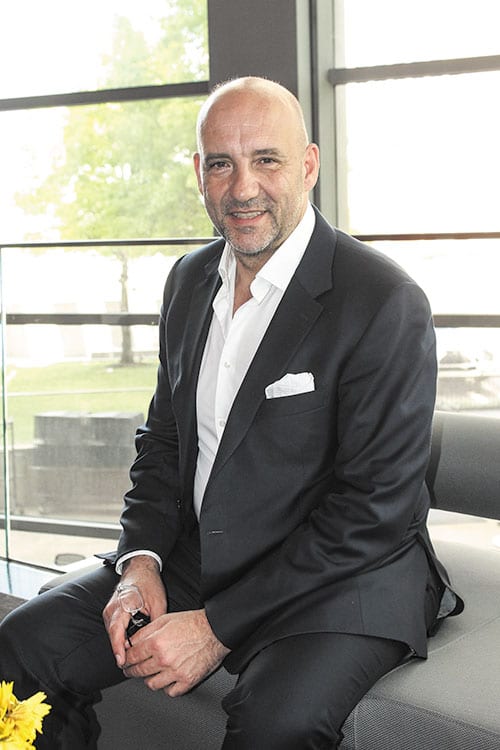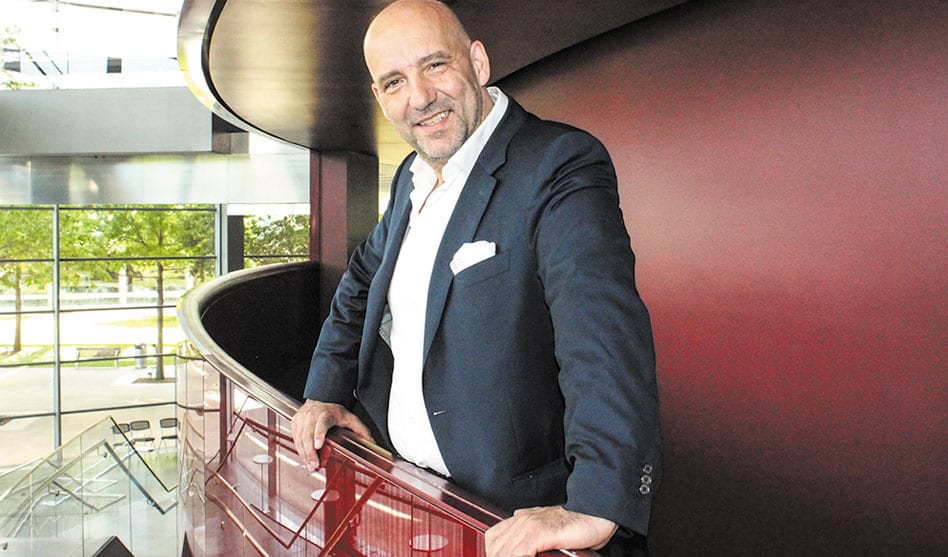Emmanuel Villaume in front of the Winspear’s iconic red façade. (Photo by Arnold Wayne Jones)
Dallas Opera music director Emmanuel Villaume straddles many worlds in his mission to serve the community with music
ARNOLD WAYNE JONES | Executive Editor
jones@dallasvoice.com
 It is a warm, windless spring day, and despite the fact he’s dapperly dressed in a dark blue serge suit, Emmanuel Villaume insists on sitting outside in the midday sun. When your native land is the cold climate of Northern Europe — the Alsatian city of Strasbourg on the French-German border — you tend not to complain about the Texas heat, but bask in its radiant warmth, protected only by the umbra of the Meyerson Symphony Center. In fact, soon after our chat, Villaume will be headed for Saint Petersburg, Russia — a city hardly known for its balmy weather, even in summer — for a conducting assignment.
It is a warm, windless spring day, and despite the fact he’s dapperly dressed in a dark blue serge suit, Emmanuel Villaume insists on sitting outside in the midday sun. When your native land is the cold climate of Northern Europe — the Alsatian city of Strasbourg on the French-German border — you tend not to complain about the Texas heat, but bask in its radiant warmth, protected only by the umbra of the Meyerson Symphony Center. In fact, soon after our chat, Villaume will be headed for Saint Petersburg, Russia — a city hardly known for its balmy weather, even in summer — for a conducting assignment.
Such is the typical, hectic, sometimes-not-quite-glamorous life of an internationally-in-demand conductor. (“It’s a lot of sleeping pills and water,” Villaume jokes about the exhausting travel, though he does admit to having tons of accumulated frequent flier miles.) When appointed music director of the Dallas Opera in 2013, Villaume became the first new conductor to lead the company in nearly 20 years. His tenure has been marked by several world premiere commissions and overall acclaim for his work behind the podium. But the demands of leading — alongside the DO’s new general director Ian Derrer — any arts organization can be taxing. (When Derrer was introduced in his new position in April, Villaume noted, “It is a very difficult job in our environment today being the general director of an opera — according to some people, an impossible job.”)
It’s a challenge — a series of challenges, really — to balance artistic integrity with fiscal responsibility, classics of the canon with new works, while building the base of audiences and serving the broader community.
An axiom of running an opera company is that you have to rely on the ABCs: Aida, Boheme and Carmen. But Villaume would add to that. “I’d go to M or N,” he laughs. “There are really 10 to 20 big titles [in the canon]. But you need to produce something different, too. During Don Giovanni, I thought to myself, ‘I could do this every two years and I would not get bored with it. But if you do only that, then you are not extending the horizon of the audience or challenging the organization. It’s a matter of balance. That does not mean we do not do Carmen, Boheme, Aida, Traviata, Le Nozze di Figaro — these are very important and people will see them every four or five years [especially if] you shuffle them around and have new casts, new productions the next time. But these are old friends you are happy to have dinner with regularly.”
Villaume was riding high on the universal acclaim for his production of Mozart’s Don Giovanni, but that came on the heels of the edgy, 3D visuals of Van Der Aa’s modern opera Sunken Garden — surely one of the more unusual offerings ever on the Winspear stage. “Sunken Garden got [many] reactions. It didn’t leave people indifferent,” Villaume says. He considers that to be a tremendous compliment.
“The big question is the balance you create with world premieres, commissions and what I call oddballs like Sunken Garden, which is a nice one — ‘hidden gems’ is the marketing angle to it. What is very important is to establish trust with the audience in such ways so that they know if we are putting something in front of them, it is something of value. And we don’t want to break that trust.”
 That commitment has meant many innovative projects since Villaume came on board. “We have now a vocal competition — with orchestra, which very few even international competitions can do now — that has international stature. We have the very important women’s conductor initiative, which has changed how women conductors are [perceived and employed] in the industry, which has, frankly, been very good for the Dallas Opera, because it brought a lot of attention to the company and how it made us forward-looking. The key word is ‘sustainability’ for any arts organization nowadays. There is wonderful momentum in the company, great support in the community and the orchestra performing a classical symphony repertoire. We want to keep that kind of thing.”
That commitment has meant many innovative projects since Villaume came on board. “We have now a vocal competition — with orchestra, which very few even international competitions can do now — that has international stature. We have the very important women’s conductor initiative, which has changed how women conductors are [perceived and employed] in the industry, which has, frankly, been very good for the Dallas Opera, because it brought a lot of attention to the company and how it made us forward-looking. The key word is ‘sustainability’ for any arts organization nowadays. There is wonderful momentum in the company, great support in the community and the orchestra performing a classical symphony repertoire. We want to keep that kind of thing.”
But in practical terms, his work with the baton will continue to be the most visible evidence of Villaume’s impact. As with running a company, just making a performance of an opera work is a massive undertaking with more moving parts than you can imagine. And much of the responsibility rests on the shoulders of the maestro.
“Opera is complicated!” Villaume exclaims. “You have the dramaturgic line like of [the plot], the vocal line, the orchestral line and finally the staging — all of these lines are necessarily in a dialectical relationship. The orchestra can be telling another story than the words are saying. It’s true in modern opera, but in Mozart, too.”
Although the music director works in planning out a season of five or so operas, Villaume himself doesn’t conduct all of them (“No…. thank god!” he sighs). It can be a huge puzzle to put together and takes a very long time.
“In the past I would discuss [with the general director] the repertoire and what matches between my personal list and what works as an organization. You consider the ‘oddballs.’ Then you bargain and trade. I would have loved to have conducted Falstaff, which we are doing next season, but my schedule and [getting the] amazing cast we have didn’t work out. So I swallowed it and said no, we will do it [I just won’t conduct]. You’re often driven by the availability of artists. You cannot program some of those masterpieces if you can’t think from the start about casting.”
In addition to guest conducting and his duties with the DO, he is also music director and chief conductor of the Prague Philharmonia. “It was very important for me to have a position in the symphony world and the operatic world, as well as in the U.S. and Europe. It’s a good balance.”
Having a foot in multiple worlds has contributed to Villaume’s appreciation for the many disciplines that make up an opera. For instance, the actual act of conducting is mysterious even to him.
“The more I conduct, the more I realize it is about mental concentration,” he says. “You conduct with your ears and your brain, not with your hands. Bringing the line from point A to point B is something you share with the musician. But it starts somewhere other than in your hand.”
That requires an understanding of the music itself… which also isn’t as cut-and-dried as the notes on a score.
“I’ve done a lot of world premieres, mostly in the symphony repertoire but also a few operas, but it’s always interesting to see the reaction of the composer. It must be scary for a composer [to see his opera performed the first time] — where is the work? In his mind? On paper? In the performance? There is no [Beethoven’s Fifth Symphony] in the abstract but only in the performance. Music is an art of interpretation, like theater. It doesn’t have one meaning.”
Villaume started out as singer himself — the original music, he says, from the first grunts of cavemen — and so he’s in tune with the importance of the vocal performance and how it interplays with the dramatic through-line. “I like that complementary line between music and drama. You can’t have good high notes if you’re not motivated. If it’s just the high notes, it’s not interesting to me. There are some singer-actors who are not great actors but have charisma. You have some skilled tenors who have amazing dramatic qualities but not good voices. I would rather take someone who will use the voice he has and a real commitment to the role than someone with a beautiful voice who cannot emote dramatically.”
Villaume also works closely with the stage director for each production to keep those elements in harmony. “I have always been very interested in staging myself and I like stagings that challenge the piece; and I strongly dislike staging that ignores the piece. A traditional [staging is] following the libretto words by word in a literal way, but they don’t get the gesture, the energy, the poetry, the essence to the piece. The debate should not be traditional versus modern, but how much it helps you get into the heart of the piece. And sometimes it gets there at first by seeming irreverential, but gets to the sense of it.”
Robert Falls, who directed Villaume’s Don Giovanni, is singled out for special praise. “In many ways the danger with straight theater directors doing opera is that they are so intimidated [by the form] that they do even more traditional than the most traditional versions. Robert has this theatrical technique, but also this knowledge of the music — he understands the whole package. You have to be aware, but not servile,” he says.
“We also found the right proportion of being slightly edgy without shocking [the audience]. I always know when I get a proportion of people who say, ‘This was great, but a bit risque’ and [an equal number of] others, say ‘You could have gone further.’
So does he have a favorite composer to interpret… at least one he’ll pinpoint? Not a chance.
“Oh, the desert island?” Villaume asks. “I don’t believe in it. I feel at home in a very large repertoire. My repertoire is getting broader and broader and my interest is getting broader and broader. I like to do contemporary music, and I love Baroque music, but I think I should leave it to the specialists. I was at first drawn to the French repertoire — I love Debussy — but I love Wagner, Strauss. It is my tropism [from growing up in Strasbourg].”
But whether French or German composers, sung in Russian or Italian and played by a diverse group of musicians, it’s the magic of creating a new world that fuels Villaume’s passion. And it’s all intertwined with his love of being an artist.
“My favorite literature is poetry,” Villaume says, “ and what is poetry but the music of words?”

